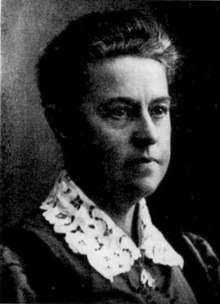Elisabeth Beskow
Elisabeth Maria Beskow (19 November 1870 – 17 October 1928) was a Swedish author. Born in Stockholm, Sweden she went to the Beskow School and later studied at the Sabbatsberg Hospital as well as the Sophiahemmet. She wrote about fifty books under the pseudonym Runa. A number of her books are translated into Danish, Finnish, French, English, German and Dutch.[2]
Elisabeth Beskow | |
|---|---|
 Elisabeth Beskow | |
| Born | Elisabeth Maria Beskow 19 November 1870 Stockholm, Sweden |
| Died | 17 October 1928 (aged 57)[1] Åre, Jämtland |
| Pen name | Runa |
| Occupation | Author |
| Language | Swedish |
| Nationality | Swedish |
| Relatives | Natanael Beskow (cousin) Elsa Beskow (cousin's wife) |
In her books she discussed the equal rights of men and women and spoke against animal testing and for vegetarianism.
Bibliography—a selection
- Allt eller intet (1895)
- Från skogarna och fjällen (Beijer, 1896)
- På Elghyttan (Fosterlandsstift, 1902)
- Nina (Fosterlandsstift, 1903)
- Var rädd om din krona! (Stockholm Fosterlandsstift : Barnaserien, 1903)
- Gamle prästen i Hornsjö och andra berättelser (Fosterlandsstiftelsen, 1904)
- Sagor och berättelser för barn (Palmquist, 1904)
- Med blicken mot det osynliga (Fosterlandsstift., 1906)
- Katri berättelse (Fosterlandsstiftelsen, 1907, Bibliotek för de unga. Ungdomsserien ; 6)
- Röster (A. V. Carlson, 1909)
- Den ljusnande framtid (Fosterlandsstift, 1910, Bibliotek för de unga. Ungdomsserien ; 9)
- Vildfågel (A. V. Carlson, 1911)
- I vildmarken och andra berättelser från Lappland (A. V. Carlson, 1911)
- Korsfararne, handling i dramatisk form, (A. V. Carlson, 1912)
- Ljudande malm (Rock Island, Ill. : Augustana Book Concern, [1912?])
- Vildfågels näste (A. V. Carlson, 1913)
- En tonskapelse berättelse (A. V. Carlson, 1913)
- Han och hans hustru (A. V. Carlson, 1915)
- Grannarna i Västanfors (A. V. Carlson, 1916)
- Sif (Carlson, 1917)
- Lärobok i stenografi (Gumperts bokh. i distr., 1917)
- Birger Löwing (A. V. Carlson, 1918)
- Hans moders gud (A. V. Carlson, 1914)
- Birger Löwing (A. V. Carlson, 1918)
- Den lille väpnaren, sagor och berättelser för barn 2:a uppl, (Lindblad, 1919)
- Fostersyskonen (Stockholm, 1922)
- Hans ögons ljus (A. V. Carlson, 1923
- Ekekronas (A. V. Carlson, 1924)
- Fader och son (A. V. Carlson, 1925)
- Gossar och flickor (Lindblad, 1925)
- Ols Barbro (A. V. Carlson, 1921)
- Skalunga I och II (Carlson 1919–25)
- Skiftande dagrar berättelser (Lindblad, 1926)
- Trettonåringar (A. V. Carlson, 1926)
- Testamentet (A. V. Carlson, 1927)
- Vårdrömmar (Uppsala, 1927)
- Förnyelse, (A. V. Carlson, 1928)
- Vardagsliv
gollark: That isn't actually very good.
gollark: What?
gollark: I mostly just assume that things will go horribly unless someone comes up with a convenient workaround requiring no social change, such as geoengineering or something.
gollark: I mean, yes, it would be *bad* if we ignored the problem and flew pollutingly, but that doesn't mean people won't do it anyway.
gollark: It totally can. Climate change is an abstract and fairly faraway issue for people. "I can't conveniently fly like I used to" is really obvious and immediate.
References
- Sveriges Dödbok 1901–2009 (DVD-ROM, 5 ed.). Solna: Sveriges Släktforskarförbund. 2010. ISBN 978-91-87676-59-8.
- Oterdahl, Jeanna (1924). "Elisabeth M Beskow". Svenskt biografiskt lexikon (in Swedish). 04. Stockholm: National Archives of Sweden. p. 88. Retrieved 4 October 2015.
This article is issued from Wikipedia. The text is licensed under Creative Commons - Attribution - Sharealike. Additional terms may apply for the media files.